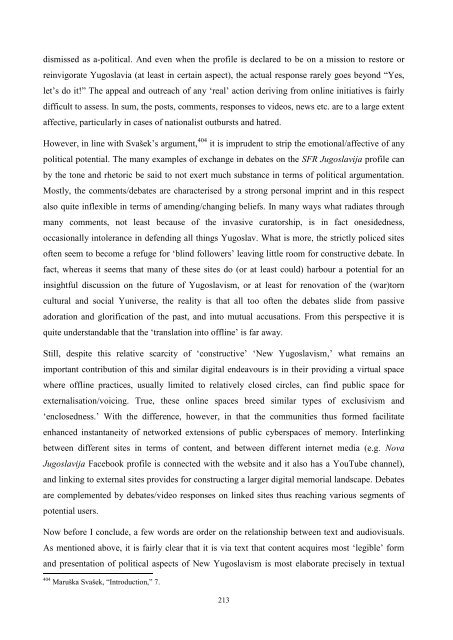UNIVERSITY OF NOVA GORICA GRADUATE SCHOOL ...
UNIVERSITY OF NOVA GORICA GRADUATE SCHOOL ...
UNIVERSITY OF NOVA GORICA GRADUATE SCHOOL ...
Create successful ePaper yourself
Turn your PDF publications into a flip-book with our unique Google optimized e-Paper software.
dismissed as a-political. And even when the profile is declared to be on a mission to restore or<br />
reinvigorate Yugoslavia (at least in certain aspect), the actual response rarely goes beyond ―Yes,<br />
let‘s do it!‖ The appeal and outreach of any ‗real‘ action deriving from online initiatives is fairly<br />
difficult to assess. In sum, the posts, comments, responses to videos, news etc. are to a large extent<br />
affective, particularly in cases of nationalist outbursts and hatred.<br />
However, in line with Svašek‘s argument, 404 it is imprudent to strip the emotional/affective of any<br />
political potential. The many examples of exchange in debates on the SFR Jugoslavija profile can<br />
by the tone and rhetoric be said to not exert much substance in terms of political argumentation.<br />
Mostly, the comments/debates are characterised by a strong personal imprint and in this respect<br />
also quite inflexible in terms of amending/changing beliefs. In many ways what radiates through<br />
many comments, not least because of the invasive curatorship, is in fact onesidedness,<br />
occasionally intolerance in defending all things Yugoslav. What is more, the strictly policed sites<br />
often seem to become a refuge for ‗blind followers‘ leaving little room for constructive debate. In<br />
fact, whereas it seems that many of these sites do (or at least could) harbour a potential for an<br />
insightful discussion on the future of Yugoslavism, or at least for renovation of the (war)torn<br />
cultural and social Yuniverse, the reality is that all too often the debates slide from passive<br />
adoration and glorification of the past, and into mutual accusations. From this perspective it is<br />
quite understandable that the ‗translation into offline‘ is far away.<br />
Still, despite this relative scarcity of ‗constructive‘ ‗New Yugoslavism,‘ what remains an<br />
important contribution of this and similar digital endeavours is in their providing a virtual space<br />
where offline practices, usually limited to relatively closed circles, can find public space for<br />
externalisation/voicing. True, these online spaces breed similar types of exclusivism and<br />
‗enclosedness.‘ With the difference, however, in that the communities thus formed facilitate<br />
enhanced instantaneity of networked extensions of public cyberspaces of memory. Interlinking<br />
between different sites in terms of content, and between different internet media (e.g. Nova<br />
Jugoslavija Facebook profile is connected with the website and it also has a YouTube channel),<br />
and linking to external sites provides for constructing a larger digital memorial landscape. Debates<br />
are complemented by debates/video responses on linked sites thus reaching various segments of<br />
potential users.<br />
Now before I conclude, a few words are order on the relationship between text and audiovisuals.<br />
As mentioned above, it is fairly clear that it is via text that content acquires most ‗legible‘ form<br />
and presentation of political aspects of New Yugoslavism is most elaborate precisely in textual<br />
404 Maruška Svašek, ―Introduction,‖ 7.<br />
213

















